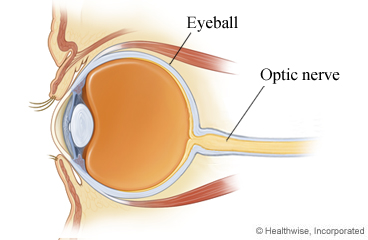What is it?
A dilated eye exam lets your eye doctor see the back of your eye (retina). It's usually done as part of a regular eye exam. To do the test, the doctor uses a light and a magnifying tool.
Why is this test done?
This test is done to look for eye problems and eye diseases. It also can be used to find other problems, such as head injuries or brain tumors.
It's usually part of a regular eye exam. You may also have a vision test and a test for glaucoma.
How is the test done?
Tell your doctor if you or anyone in your family has glaucoma. And tell your doctor if you are allergic to any type of eyedrops.
Your doctor will use eyedrops to widen (dilate) your pupils. This makes it easier to see the back of the eye. Your doctor may also use eyedrops to numb the surface of your eyes. It takes about 15 to 20 minutes to fully dilate the pupils.
When your pupils are dilated, your doctor will shine a bright light into your eyes and examine them.
What happens after the test?
- Your vision will be blurry for several hours.
- You will probably be able to go home or back to your usual activities right away. But your eyes will be sensitive. Wear sunglasses to protect them from the sun.
- Do not drive for several hours after your eyes were dilated, unless your doctor says it's okay.
When should you call for help?
Watch closely for changes in your health, and be sure to contact your doctor if you have questions about the test.
Follow-up care is a key part of your treatment and safety. Be sure to make and go to all appointments, and call your doctor if you are having problems. It's also a good idea to keep a list of the medicines you take. Ask your doctor when you can expect to have your test results.
Current as of: October 1, 2025


